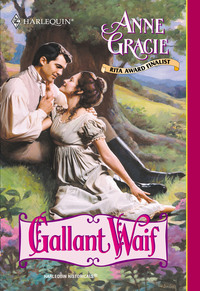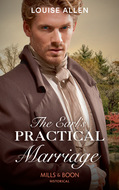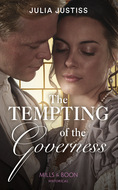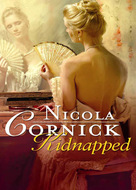Książki nie można pobrać jako pliku, ale można ją czytać w naszej aplikacji lub online na stronie.
Czytaj książkę: «Gallant Waif»
Kate’s chin rose stubbornly.
A faint glimmer of amusement appeared in Jack’s eyes. She was calling his bluff, was she? After tossing that coffeepot, she had a right to expect that he might want to throttle her. And then she’d slapped him—slapped the master of the house. So foolhardy. He could snap her in two if he chose; she would surely know that. She wasn’t to know he’d never hurt a woman in his life. But did she shrink back in fear? No, on she came, chin held defiantly high. His amusement deepened. Such a little creature, but with so much spirit.
Harlequin Historicals is delighted to introduce 2000 RITA Award finalist Anne Gracie and her North American debut book
Gallant Waif
Harlequin Historical #557
#555 ONE KNIGHT IN VENICE
Tori Phillips
#556 THE SEDUCTION OF SHAY DEVEREAUX
Carolyn Davidson
#558 NIGHT HAWK’S BRIDE
Jillian Hart
Gallant Waif
Anne Gracie

MILLS & BOON
Before you start reading, why not sign up?
Thank you for downloading this Mills & Boon book. If you want to hear about exclusive discounts, special offers and competitions, sign up to our email newsletter today!
Or simply visit
Mills & Boon emails are completely free to receive and you can unsubscribe at any time via the link in any email we send you.
Contents
Prologue
Chapter One
Chapter Two
Chapter Three
Chapter Four
Chapter Five
Chapter Six
Chapter Seven
Chapter Eight
Chapter Nine
Chapter Ten
Chapter Eleven
Chapter Twelve
Chapter Thirteen
Chapter Fourteen
Chapter Fifteen
Chapter Sixteen
Chapter Seventeen
Epilogue
Prologue
Kent, England. Late summer, 1812.
“No, no, Papa. I won’t. You cannot make me!”
“Please, my sweet, I beg of you. It will not take long and I fear he will take no notice of me.”
The tall dark-haired man waiting alone in the drawing-room reacted to the voices, which seemed to come from outside. He turned sharply and let out a soft expletive, his face tensed in pain. Moving more cautiously, he flexed his leg carefully, supporting himself with his cane. His sudden pallor gradually disappeared as the pain ebbed slowly away.
He glanced towards the sound of the voices and swallowed, tugging nervously at his cravat, thus ruining the effect that he’d taken hours to achieve. His clothes were of the finest quality, although somewhat out of date; they seemed to have been tailored for a slightly larger gentleman, for the coat that should have fitted snugly was loose everywhere except across the shoulders. The gentleman himself was rather striking to behold as he stood staring blankly out of the window, tall, broad-shouldered and darkly handsome, yet thin, almost to the point of gauntness.
Jack Carstairs had done enough waiting. It had been bad enough being closed up in a carriage for hours upon end to get here…then to be left closeted in the front parlour for almost half an hour was too much for a man who’d spent the last three years out of doors, commanding troops under Wellington on the Peninsula. He opened the French doors on to the terrace and stepped outside into the cool, fresh air, and was immediately rewarded by the sweet, melodic tones of his beloved.
Jack stepped forward impatiently. Three years, and now the waiting was at an end. In just minutes he would hold her in his arms again, and the nightmare would be over. He limped eagerly towards the sound of the voices coming from the open French windows further along the terrace.
“No, Papa, you must tell him. I do not wish to see him.” Julia’s voice was petulant, sulky. Jack had never heard it so before.
“Now, now, my dear, I will speak to him and put him right, never fear, but you must see that it is necessary for you to at least come with me, for you know he will not believe me otherwise.”
Jack froze. He had received a letter full of sweetness and love from Julia, only a month ago, just before he was wounded. It was in the same batch of letters that had told him of his father’s death. Months after the event, as was all mail received on the Peninsula.
The lovely, well-remembered voice became more petulant, almost childish. “I don’t want to see him, I don’t. He’s changed, I know, I saw him from the window.”
Her father’s voice was coaxing. He’d always been wax in the hands of his beautiful daughter, but for once he was standing relatively firm. “Well, now, my dear, you have to expect that. After all, he has been at war and war changes a man.”
Julia made a small sound, which from anyone less exquisite would have been called a snort. “He…he’s ugly now, Papa; his face is ruined.”
Unconsciously Jack fingered the harsh, still livid scar that bisected his cheek from temple to mouth.
“And he can hardly even walk.” Her voice grew soft and coaxing. “Please, Papa, do not make me speak to him. I cannot bear even to look at him, with his leg sticking out in that peculiar-looking way. It would have been better if he had died than to come back like that.”
“My dear!” Her father sounded shocked.
“Oh, I know it seems hard,” Julia continued, “but when I think of my beautiful Jack and how he is now I could weep. No, Papa, it’s just not possible.”
“Are you sure, my dear?”
“Of course I am sure. You told me yourself his father left him nothing. I cannot marry a pauper.” She stamped her foot. “It makes me so angry to think of it—all that time wasted, waiting! And, in any case, he can barely walk without falling over, so you can be very sure that he will never dance with me again as he used to…”
Her voice tailed off as she recalled the magic moments she had spent on the dance floor, the cynosure of every eye, the envy of every other woman in the room. She stamped her foot again, angry at being deprived of all she had expected.
“No, Papa, it is quite impossible! I am glad now that you would not allow us to announce the betrothal formally, though I thought you monstrous cruel at the time.”
Jack had heard enough. His face white and grim, he drew back the draperies which had concealed him and stepped into the room.
“I think that says it all, does it not?” he said in a soft, deadly voice.
There was a small flurry as the two absorbed what he might have heard. There was no telling how long he had been outside. Jack limped quietly to the door and pointedly held it open for Julia’s father to make his exit.
“I believe your presence is no longer required, Sir Phillip,” he said. “If you would be so good as to leave us alone, sir?”
Sir Phillip Davenport began to bluster. “Now see here, Carstairs, I won’t be ordered about in my own house. I can see it must be a nasty shock for you, but you are no longer in a position to support my daugh—”
“Thank you, sir.” Jack cut across him. “I understand what you are saying, but I believe I am owed the courtesy of a few moments alone with my betrothed.”
The voice which had spent years commanding others had its usual effect. Julia’s father began to look uncomfortable and took a few steps towards the door.
“Oh, but…” Julia began.
“As far as I am concerned our betrothal has not yet been dissolved and I believe I have the right to be told of it in person.” Jack gestured again for her father to leave. Observing that gentleman’s hesitation and concern, his lip curled superciliously. He added silkily, “I assure you, Davenport, that, while I may be changed in many respects, I am still a gentleman. Your daughter is safe with me.”
Sir Phillip left, leaving his daughter looking embarrassed and angry. There was a long moment of silence. Julia took a quick, graceful turn about the room, the swishing of her skirts the only sound in the room. The practised movements displayed, as they were meant to do, the lush, perfect body encased in the finest gown London could provide, the fashionable golden coiffure, the finely wrought jewellery encircling her smooth white neck and dimpled wrists. Finally Julia spoke.
“I am sorry if you heard something that you didn’t like, Jack, but you must know that eavesdroppers never hear any good of themselves.” She shrugged elegantly, glided to the window and stood gazing out, seemingly absorbed in the view of the fashionably landscaped garden beyond the terrace.
Jack’s face was grim, the scar twisting down his cheek standing out fresh and livid against his pallor.
“God damn it, Julia, the least you could have done was told me to my face—what’s left of it,” he added bitterly. “It’s partly because of you that I’m in this situation in the first place.”
She turned, her lovely mouth pouting with indignation. “Well, really, Jack, how can you blame me for what has happened to you?”
His lips twisted sardonically and he shrugged, his powerful shoulders straining against the shabby, light, superfine coat.
“Perhaps not directly. But when my father ordered me to end our betrothal you cast yourself into my arms and begged me to stand firm. Which of course I did.”
“But how was I to know that that horrid old man truly would disinherit you for disobeying him?”
His voice was cool, his eyes cold. “That horrid old man was my father, and I told you at the time he would.”
“But he doted on you! I was sure he was only bluffing…trying to make you dance to his tune.”
His voice was hard. “It’s why I purchased a commission in the Guards, if you recall.”
The beautiful eyes ran over his body, skipping distastefully over the scarred cheek and the stiffly extended leg.
“Yes, and it was the ruination of you!” She pouted, averting her eyes.
He was silent for a moment, remembering what she had said to her father. “I am told that I will never dance again. Or ride.”
“Exactly,” she agreed, oblivious to his hard gaze. “And will that horrid scar on your face go away too? I doubt it.”
She suddenly seemed to notice the cruelty of what she had said. “Oh, forgive me, Jack, but you used to be the handsomest man in London, before…that.” She gestured distastefully towards the scar.
With every word she uttered, she revealed herself more and more, and the pain and disillusion and anger with himself was like a knife twisting in Jack’s guts. For this beautiful, empty creature he had forever alienated his father. Like Julia, he had never in his heart of hearts believed his father would truly disinherit him, but it seemed his father had died with Jack unforgiven. It was that which hurt Jack so deeply; not the loss of his inheritance, but the loss of his father’s love.
Feeling uncomfortable under Jack’s harsh scrutiny, Julia took a few paces around the room, nervously picking up ornaments and elegant knick-knacks, putting them down and moving restlessly on.
Jack watched her, recalling how the memory of her grace and beauty had sustained him through some of the worst moments of his life. It had been like a dream then, in the heat and dust and blood of the Peninsula War, to think of this lovely, vital creature waiting for him. And that’s all it was, he told himself harshly—a dream. The reality was this vain, beautiful, callous little bitch.
“Oh, be honest, Jack.” She twirled and stopped in front of him. “You are no longer the man I agreed to marry. Can you give me the life we planned? No.”
She shrugged. “I am sorry, Jack, but, painful though it is for both of us, you must see it is just not at all practical any more.”
“Ahh, not practical?” he echoed sarcastically. “And what exactly is not practical? Is it my sudden lack of fortune? My ruined face? Or the idea of dancing with an ugly cripple and thereby becoming an object of ridicule? Is that it, eh?”
She cringed in fright at the savagery in his voice.
“No, it is not practical, is it?” he snarled. “And I thank God for it.”
She stared as she took in the meaning of his last utterance.
“Do…do you mean to say you don’t want to marry me?” Her voice squeaked in amazement and dawning indignation. It was for her to give him his congé, not the other way around.
He bowed ironically. “Not only do I not wish to marry you, I am almost grateful for the misfortunes which have opened my eyes and delivered me from that very fate.”
She glared at him, her bosom heaving in a way that had once entranced him. “Mr Carstairs, you are no gentleman!”
He smiled back at her, a harsh, ugly grimace. “And you, Miss Davenport, are no lady. You are a shallow, greedy, cold little bitch, and I thank my lucky stars that I discovered the truth in time. God help the poor fool you eventually snare in your net.”
She stamped her foot furiously. “How dare you? Leave this house at once…at once, do you hear me? Or crip—wounded or not, I’ll have you thrown out!”
He limped two paces forward and she skittered back in fright.
“Just give me back my ring,” he said wearily, “and your butler won’t be put to the trouble and embarrassment of manhandling a cripple.”
She snatched her left hand back against her breast and covered the large diamond ring with her other hand.
“Oh, but I am very attached to this ring, Jack,” she said in a little-girl voice. “I did love you, you know. Surely you want me to have something to remember you by?”
He looked at her, disgust filling his throat, then turned and silently limped from the house.
Chapter One
London. Late autumn, 1812.
“Good God! Do you mean to tell me my grandson did not even receive you after you’d travelled I don’t know how many miles to see him?” Lady Cahill frowned at her granddaughter. “Oh, for goodness’ sake, Amelia, stop that crying at once and tell me the whole story! From the beginning!”
Amelia gulped back her sobs. “The house is shabby and quite horrid, though the stables seem well enough—”
“I care nothing for stables! What of my grandson?” Lady Cahill interrupted, exasperated.
“His manservant told me Jack saw no one.”
The old lady frowned. “What do you mean, no one?”
“I mean no one, Grandmama, no one at all. He—Jack, that is—pretended to be indisposed. He sent a message thanking me for my concern and regretting his inability to offer me hospitality. Hospitality! His own sister!”
Amelia groped in her reticule for a fresh handkerchief, blotted her tears and continued, “Of course I insisted that I go up and tend him, but his man—a foreigner—would not even allow me up the stairs. I gathered from him that Jack was not ill…just…drunk! He won’t see anyone. And, according to his manservant, he’s been like that ever since he returned from Kent.”
There was a long pause while the old lady digested the import of this. “Kent, eh? I wish to God he had never set eyes on that poisonous little Davenport baggage.” She glanced up at her granddaughter. “I take it, then, that the betrothal is definitely at an end.”
“Unfortunately, yes, Grandmama.”
“Good!” said Lady Cahill vehemently. “He’s well rid of that little harpy and you know it.”
“But, Grandmama, it appears to have broken his heart.”
“Nonsense! He’s got a fine strong heart. He’s got my blood in him, hasn’t he? When you’re my age, you’ll stop prating of broken hearts and other such nonsense. Bodies mend and so do hearts.”
There was a long silence.
“But that’s just it, isn’t it, Grandmama?” Amelia said at last. “Bodies don’t always mend, do they? Jack’s servant said that Jack’s leg is still very bad and painful, although he can walk.”
Lady Cahill thought of the way her favourite grandson had looked when he’d come back from the wars in Spain. Such a fine tall, athletic lad he had been, too, before he left. But now…
She glared at her granddaughter. “Don’t let me ever hear you speaking such rubbish, do you hear me, gel? Never! That boy is as fine a lad as ever he was, you mark my words! He’s got a fine fighting spirit in him.”
“I saw no fighting spirit, Grandmama.”
“Do you try to tell me, gel, that my grandson has had the stuffing knocked out of him and hides himself away from the world merely because his betrothal to that beautiful, heartless little viper is at an end? Faugh!” Lady Cahill snorted. “You’ll not make me believe that, not in a month of Sundays.”
“No,” said Amelia slowly. “But that, on top of everything else…He will never ride again, they say. And so many of his friends have been killed in the war…And, Grandmama, you know how much Papa’s will hurt him—to be left with virtually nothing…”
“Lord knows what maggot was in your father’s mind at the time,” agreed Lady Cahill. “Bad enough to disinherit the boy, but to leave him ‘whatever is found in my pockets on the day I die”’…Faugh! Utter folly! “Twas the veriest coincidence that he died after a night of cards at White’s. Had he not just won that deed to Sevenoakes, the boy would not even have a roof over his head!”
Lady Cahill snorted in disgust. Yes, Jack had taken some terrible blows, one on top of another. But even discounting Amelia’s dramatics it seemed he was taking it badly. He could not be allowed to brood like that. He needed something to snap him out of it.
There was a soft knock at the door. “Yes, what is it, Fitcher?” the old lady snapped, her temper frayed by concern for her grandson.
“Pardon me, milady.” The butler bowed. “This letter was delivered a few moments ago.” He bowed again, proffering a letter on a silver salver.
Lady Cahill picked up the letter, wrinkling her nose in disdain at the undistinguished handwriting which gave her direction. “Humph,” she muttered. “Not even franked.”
She turned it over and broke the seal. She frowned over the letter, muttering crossly to herself as she did. Finally she threw it down in frustration.
“What is it, Grandmama?”
“Demmed if I can read the thing. Shockin’ bad hand and the spelling is atrocious. Can’t think who’d be sending me such rubbish. Toss it in the fire, girl!”
The young woman picked the letter up and smoothed it out. “Would you like me to try?”
Taking the snort she received from her grandmother to be assent, Amelia read it out, hesitating occasionally over misspellings and illegible words, of which there were many.
Milady I be right sorry to be addressing you like this it being above my station to be writing to Countesses but I cannot think of who else to turn to…
“A begging letter!” the Dowager Countess snapped in outrage. “On to the fire with it at once!”
“I think not, Grandmama,” said Amelia, scanning ahead. “Let me finish.”
…for my poor girl is now left all alone in the world with no kin to care what become of her but it do seem a right shame that the daughter of gentlefolk should have to skivvy to stay alive…
Lady Cahill’s eyes kindled with anger. “By God, she’s trying to palm one of your father’s by-blows off on to us!”
“Grandmama!” Amelia blushed, horrified.
“Oh, don’t be so mealy-mouthed, girl. You must know your father had any number of bits o’ fluff after your dear mother died, and they didn’t mean a thing, so don’t pretend. But it’s nothing to do with us. Your father would have left any base-born child well provided for. He was a gentleman, after all, even if he was a fool! Now toss that piece of impertinence in the fire at once, I say!”
But her granddaughter had forgotten her blushes and was avidly reading on. “No, wait, Grandmama, listen to this.”
And being as I was her old nurse even if some as did say I wasn’t good enough to be nurse to Vicar’s daughter it falls to me to let you know what my girl has come to being as you was godmother to Miss Maria her poor sainted mother…
Lady Cahill sat up at this and leant forward, her eyes sharp with interest.
…and her only remaining child so now there be nothing left for her but to Take Service her not willing to be took in by myself and truth to tell there be little enough for me alone so I beg ye Milady please help Miss Kate for as the Lord is my witness there be no other who can yours truly Martha Betts.
“Do you know any of these people, Grandmama?” said Amelia curiously.
“I believe I do,” said her grandmother slowly, picking up the letter and scanning it again. “I think the girl must be the daughter of my godchild Maria Farleigh—Maria Delacombe as she used to be. She married a parson and died giving birth to a daughter…must be nigh on twenty years ago. She had two boys before that, can’t recall their names now, and I lost touch with the family after she died, but it could be the same family.”
She peered at the address. “Is that Bedfordshire I see? Yes. Hmm. No kin? What can have happened to the gel’s father and brothers?” Lady Cahill frowned over the letter for a short time, then tossed it decisively down on a side table.
“What do you mean to do, Grandmama?”
Lady Cahill rang for sherry and biscuits.
Amelia’s husband arrived and they all went in to dinner. Over cream of watercress soup, Lady Cahill announced her decision.
“But, Grandmama, are you sure about this?” Amelia looked distressed. “It’s a very long journey. What if Jack won’t receive you, either?”
Lady Cahill gave her granddaughter a look of magnificent scorn. “Don’t be ridiculous, Amelia!” she snorted. “I have never in my life been denied entrée to any establishment in the kingdom. I go where I choose. I was a Montford, gel, before my marriage to your grandfather, and no one, not even my favourite grandson, tells me what I may or may not do!”
She dabbed her mouth delicately on a damask napkin and poured her sherry into the soup. “Tasteless rubbish!”
Later, as she pushed cailles à la Turque around her plate, she said, “I’ll call upon Maria’s gel on my way to visit Jack. I cannot let her starve and I’ll not allow Maria Farleigh’s child to enter into service! Faugh! The very idea of it. Maria’s mother would turn in her grave. She was a fool to let her daughter marry a penniless parson.” Lady Cahill’s eyes narrowed as she considered the shocking mésalliance.
“The Farleighs were a fine old family,” she admitted grudgingly, “but he was the last of his line and poor as a church mouse to boot. Church mouse. Parson! Ha!” She cackled, noticing her unintended pun, then fell silent.
She heaved a sigh and straightened her thin old shoulders wearily. She pushed her plate away and called for more sherry.
“Yes, I’ll roust the boy out of his megrims and keep him busy.” Lady Cahill ignored the Scotch collops, the lumber pie, the buttered parsnips and the chine of salmon boiled with smelts. She helped herself to some lemon torte. “Can’t leave him brooding himself into a decline up there in the wilds of Leicestershire with no one but servants to talk to.” She shook her head in disgust. “Never did believe in servants anyhow!”
Amelia tried valiantly to repress a gasp of astonishment and met her husband’s amused twinkle across the table. For a woman who considered a butler, dresser, cook, undercook, housekeeper, several housemaids and footmen, a scullery-maid, coachman and two grooms the bare minimum of service needed to keep one elderly woman in comfort, it was a remarkable statement.
“No, indeed, Grandmama,” Amelia managed, bending her head low over her plate.
“Don’t hunch over your dinner like that, girl,” snapped the old woman. “Lord, I don’t know how this generation got to be so rag-mannered. It wouldn’t have been tolerated in my day.”
The knocker sounded peremptorily, echoing through the small empty cottage. This was it, then, the moment she had been waiting for and dreading equally. The moment when she stopped being Kate Farleigh, Vicar Farleigh’s hoydenish daughter, and became Farleigh, maidservant, invisible person.
Now that the moment had come, Kate was filled with the deepest trepidation. It was a point of no return. Her heart was pounding. It felt like she was about to jump off a cliff…The analogy was ridiculous, she told herself sternly. She wasn’t jumping, she had been pushed long ago, and there was no other choice…
Squaring her shoulders, Kate took a deep breath and opened the door. Before her stood an imperious little old lady clad in sumptuous furs, staring at her with unnervingly bright blue eyes. Behind her was a stylish travelling coach.
“Can I help you?” Kate said, politely hiding her surprise. Nothing in Mrs Midgely’s letter had led her to expect that her new employer would be so wealthy and aristocratic, or that she would collect Kate herself.
The old lady ignored her. With complete disregard for any of the usual social niceties, she surveyed Kate intently.
The girl was too thin to have any claim to beauty, Lady Cahill decided, but there was definitely something about the child that recalled her beautiful mother. Perhaps it was the bone structure and the almost translucent complexion. Certainly she had her mother’s eyes. As for the rest…Lady Cahill frowned disparagingly. Her hair was medium brown, with not a hint of gold or bronze or red to lift it from the ordinary. At present it was tied back in a plain knot, unadorned by ringlets or curls or ribands, as was the fashion. Indeed, nothing about her indicated the slightest acquaintance with fashion, her black clothes being drab and dowdy, though spotlessly clean. They hung loosely upon a slight frame.
Kate flushed slightly under the beady blue gaze and put her chin up proudly. Was the old lady deaf? “Can I help you?” she repeated more loudly, a slight edge to her husky, boyish voice.
“Ha! Boot’s on the other foot, more like!”
Kate stared at her in astonishment, trying to make sense of this peculiar greeting.
“Well, gel, don’t keep me waiting here on the step for rustics and village idiots to gawp at! I’m not a fairground attraction, you know. Invite me in. Tush! The manners of this generation. I don’t know what your mother would have said to it!”
Lady Cahill pushed past Kate and made her way into the front room. She looked around her, taking in the lack of furniture, the brighter patches on the wall where paintings had once hung, the shabby fittings and the lack of a fire which at this time of year should have been crackling in the grate.
Kate swallowed. It was going to be harder than she thought, learning humility in the face of such rudeness. But she could not afford to alienate her new employer, the only one who had seemed interested.
“I collect that I have the honour of addressing Mrs Midgely.”
The old lady snorted.
Kate, unsure of the exact meaning of the sound, decided it was an affirmative. “I assume, since you’ve come in person, that you find me suitable for the post, ma’am.”
“Humph! What experience do you have of such work?”
“A little, ma’am. I can dress hair and stitch a neat seam.” Neat? What a lie! Kate shrugged her conscience aside. Her stitchery was haphazard, true, but a good pressing with a hot flatiron soon hid most deficiencies. And she needed this job. She was sure she could be neat if she really, really tried.
“Your previous employer?”
“Until lately I kept house for my father and brothers. As you can see…” she gestured to her black clothes “…I am recently bereaved.”
“But what of the rest of your family?”
This old woman was so arrogant and intrusive, she would doubtless be an extremely demanding employer. Kate gritted her teeth. This was her only alternative. She must endure the prying.
“I have no other family, ma’am.”
“Hah! You seem an educated, genteel sort of girl. Why have you not applied for a post as companion or governess?”
“I am not correctly educated to be a governess.” I am barely educated at all.
The old lady snorted again, then echoed Kate’s thought uncannily. “Most governesses I have known could barely call themselves educated at all. A smattering of French or Italian, a little embroidery, the ability to dabble in watercolours and to tinkle a tune on a pianoforte or harp is all it takes. Don’t tell me you can’t manage that. Why, your father was a scholar!”
Yes, but I was just a girl and not worth educating in his eyes. In her efforts to control the anger at the cross-questioning she was receiving, it did not occur to Kate to wonder how the old woman would know of her father’s scholarship. If Mrs Midgely wished Kate to be educated, Kate would not disappoint her. Some women enjoyed having an educated person in a menial position, thinking it added to their consequence.
“I know a little Greek and Latin from my brothers—” the rude expressions “—and I am acquainted with the rudiments of mathematics…” I can haggle over the price of a chicken with the wiliest Portuguese peasant. It suddenly occurred to Kate that perhaps Mrs Midgely had grandchildren she wished Kate to teach. Hurriedly Kate reverted to the truth. It would not do to be found out so easily.
“But I cannot imagine anyone offering a tutor’s position to a female. I have no skill with paints and have never learnt to play a musical instrument…” No, the Vicar’s unwanted daughter had been left to run wild as a weed and never learned to be a lady.
“I do speak a little French, Spanish and Portuguese.”
“Why did you not seek work as a companion, then?”
Kate had tried and tried to find a position, writing letter after letter in answer to advertisements. But she had no one to vouch for her, no references. Someone from Lisbon had written to one of her female neighbours and suddenly she was persona non grata to people who had known her most of her life. It hadn’t helped that the girl they remembered had been a wild hoyden, either. There were many who had predicted that the Vicar’s daughter would come to a bad end. And they were right.
Darmowy fragment się skończył.








